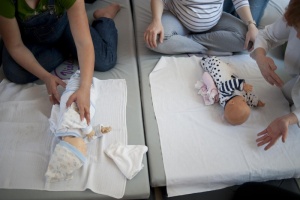
The report “Trends in maternal mortality: 1990 to 2010”, shows that from 1990 to 2010, the annual number of maternal deaths dropped from more than 543,000 to 287,000 – a decline of 47 per cent. In Bosnia and Herzegovina estimated maternal mortality ratio in 1990 was 18 per 100,000 while 20 years later, in 2010, it stood at 8 women per 100,000 live births which shows a positive drop of 56 per cent. This is the same as the maternal mortality ratio of France and is the lowest in South Eastern Europe. However, these figures are based on estimates.
There is a disparity within and across countries and regions of the world. One third of all maternal deaths occur in just two countries – in 2010, almost 20 per cent of deaths (56,000) were in India and 14 per cent (40,000) were in Nigeria. Of the 40 countries with the world’s highest rates of maternal death, 36 are in sub-Saharan Africa
“Attaining Millennium Development Goal 5 – Improving maternal health – in Bosnia and Herzegovina will require more support. While on the one hand the country has been very successful in keeping the maternal mortality rate low, on the other hand it needs to invest more in ensuring universal access to reproductive health and reproductive health commodities, and improve maternal health through the establishment of strategic frameworks such as for the prevention of cervical cancer, which is the one of the highest causes of mortality among women in Bosnia and Herzegovina. Additionally, Bosnia and Herzegovina needs to improve its administrative sources of statistical data instead of relying on estimates” said Faris Hadrovic, Assistant Representative of UNFPA Bosnia and Herzegovina.
An important challenge that makes it difficult to assess progress accurately is the lack of reliable information about maternal deaths. In many developing countries, deaths may go uncounted and frequently the cause is not recorded correctly, particularly when women die at home.
"Over a quarter of a million women still die in pregnancy and childbirth each year, and more than 215 million women lack access to modern contraceptives. Meeting the need for voluntary family planning for these women would not only fulfill a human right, it would also reduce the number of maternal deaths by a third. This is a highly cost-effective public health strategy” said the Executive Director of UNFPA, Dr. Babatunde Osotimehin.
“Trends in maternal mortality: 1990 to 2010” includes a detailed description of the methodology and the underlying data used to develop the estimates.
Links:
The new report and support materials: http://www.unfpa.org/public/home/mothers/MMEstimates2012
Stepping up Efforts to Save Mothers' Lives:
http://www.unfpa.org/public/home/mothers
Social media outreach:
Tune into the conversation! Follow #motherhood and #MMR2012
UNFPA: Delivering a world where every pregnancy is wanted, every childbirth is safe and every young person’s potential is fulfilled


